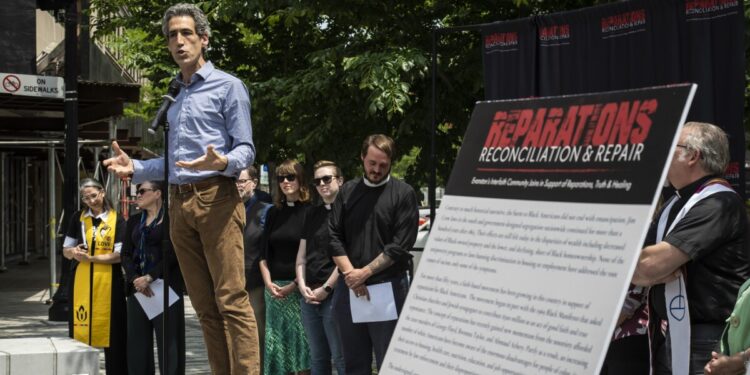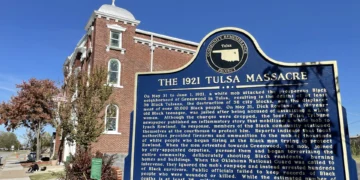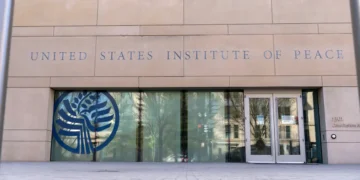Evanston Mayor Daniel Biss addresses a 2022 news conference alongside faith leaders to advocate for reparations in the northern suburb. Ashlee Rezin/Sun-Times file
May 31, 2024 Story by: Editor
EVANSTON, Ill. — A class-action lawsuit has been filed by a conservative group against Evanston, alleging that the city’s reparations program for Black residents contravenes the U.S. Constitution.
Judicial Watch, a nonprofit organization, initiated the federal lawsuit on behalf of six non-Black residents whose families resided in Evanston from 1919 to 1969—a period marked by housing discrimination that segregated Black residents in the city.
According to the lawsuit, Evanston’s reparations plan infringes upon the equal protection clause of the 14th Amendment by employing race as a criterion for eligibility.
Implemented by the Evanston City Council in 2021, the program offers up to $25,000 to Black residents connected to the community during the 1919-1969 period. Initially, the funds were designated for housing costs, but the city expanded the program last year to include direct cash payments.
Judicial Watch President Tom Fitton described the program as “a ploy to redistribute tax dollars to individuals based on race,” asserting that it “unconstitutionally discriminates against anyone who does not identify as Black or African American.” Fitton added that the lawsuit aims to uphold a “color-blind Constitution.”
An Evanston spokesperson declined to comment on ongoing litigation.
The lawsuit’s class members are seeking $25,000 payments and an injunction to prevent the city from using race as a qualification for the reparations program.
The plaintiffs contend that they would qualify for the $25,000 reparations if the program did not have a “race-based eligibility requirement.”
The lawsuit argues that Evanston’s use of race as a proxy for discrimination experienced between 1919 and 1969 results in overinclusive eligibility criteria, as it does not limit benefits to individuals who actually experienced discrimination during that period.
Evanston allocated $10 million from a cannabis sales tax in 2019 to fund the reparations program, with plans for annual allocations of $1 million over ten years.
By August of last year, the city reported disbursing approximately $1 million in payments.
Eligibility for the program is divided into three categories: “ancestors,” who are Black residents aged 18 or older between 1919 and 1969; “direct descendants,” who are Black adults with parents, grandparents, or great-grandparents who lived in Evanston during that period; and current Black adult residents who can demonstrate housing discrimination after 1969.
To date, 129 ancestor applicants have received payments, and the city has approved 454 direct descendant applications, with 80 expected to receive payments this year, according to Evanston’s Reparations Committee.
This marks the second lawsuit Judicial Watch has filed against Evanston over the reparations program. The first, related to public records, was filed in Cook County court shortly after the program’s inception in 2021 but was dismissed a few months later. Source: abc7Chicago
















